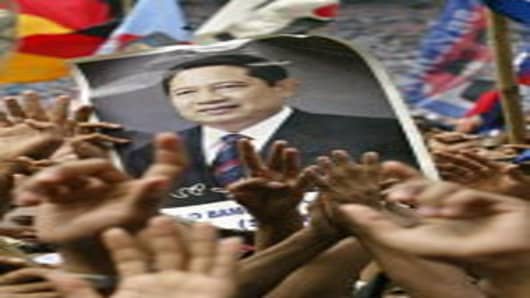Indonesia's recent policy measures, like capping foreign ownership in mines, have not gone down well with investors and the policy uncertainty is going to continue, says one expert as Southeast Asia's largest economy prepares for elections in 2014.
"We've now had a very good period of governance under President Susilo Bambang Yudhoyono on the macro front. But after 2014 he will step down, and I think that's going to be a very significant hurdle for investors as well," Rajiv Biswas, Senior Director and Asia-Pacific Chief Economist at IHS Global Insight, told CNBC on Monday.
President Yudhoyono has reportedly said he will not run in the 2014 presidential elections when his second five-year term ends.
Yudhoyono has led the country through one of its best periods of growth. In 2011, Indonesia recorded its best growth rate in over a decade at 6.5 percent, while still keeping inflation in check. Foreign direct investment increased 20 percent to top $20 billion last year.
Its stock market, the benchmark Jakarta Composite ,has outperformed many of its peers in recent years, more than doubling in the last 5 years.
"Indonesia still has got very strong macroeconomic credentials...I think Bank Indonesia did a good job last year in terms of getting inflation down," Biswas said.
But policy uncertainty continues to be a nagging worry.
"What's concerning investors now is the decision by the government to have reduction in fuel price subsidies, which will certainly result in a spike in headline inflation," he said.
While a reduction in fuel subsidies will help ease the government's fiscal burden, it will drive up consumer inflation. Cuts in fuel subsidies have in the past led to social unrest.
Protectionist Policies
Indonesia announced a ban over the weekend on foreigners being appointed to certain senior positions in locally owned companies, after capping foreign ownership in the mining sector to 49 percent, last week.
"What we've seen consistently is weakness on the microeconomic reform agenda, and that's what's hurting now," Biswas said. "I certainly think there is a sort of protectionist stance."
He added that last year Indonesia proposed a legislation curbing bank ownership, which would have limited the amount of shares an individual could hold in Indonesia's commercial banks. But it failed to go through in the end.
"Now with the new mining laws that will restrict foreign ownership, this will definitely be perceived very negatively by international investors," Biswas said.
"There are a lot of issues facing Indonesia now particularly on the business climate, and also in terms of political risk coming up, which could result in some rebalancing of global investor portfolios out of Indonesia," he added.


